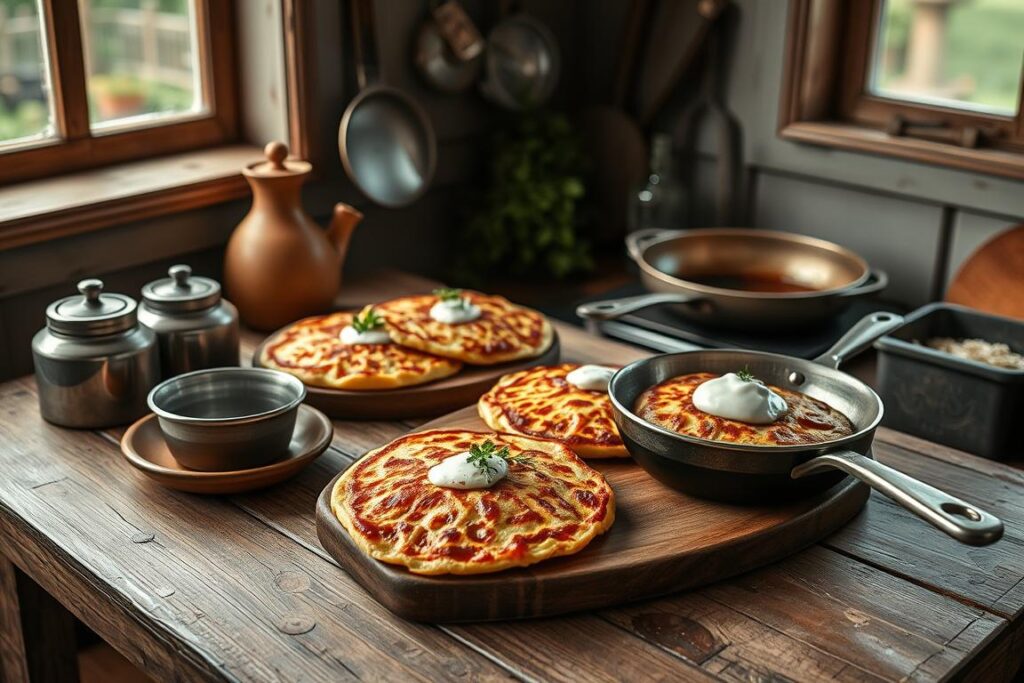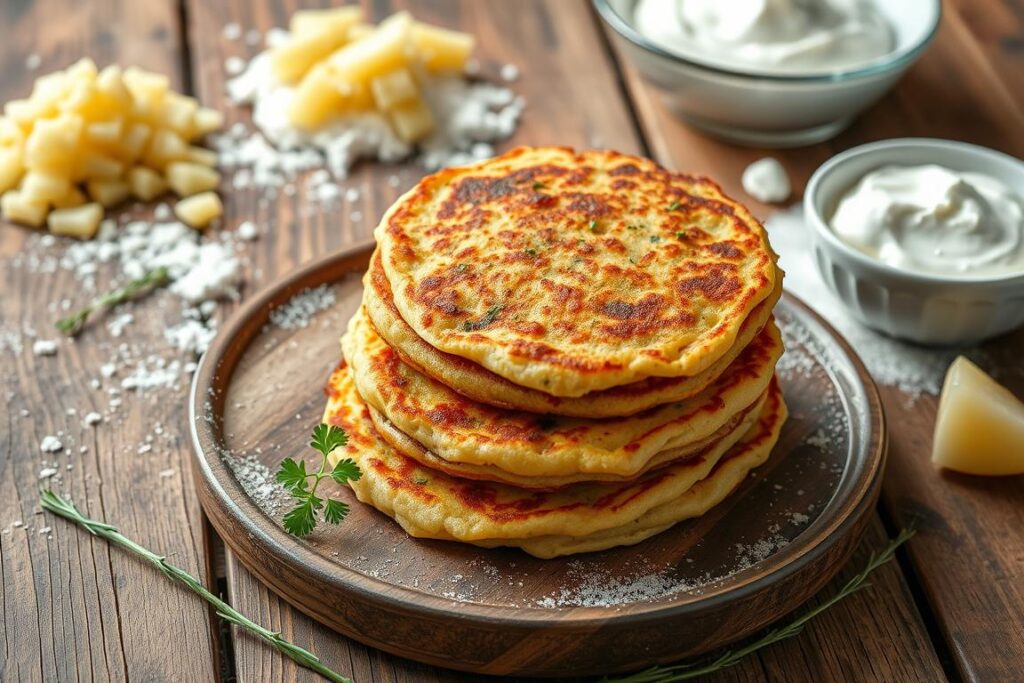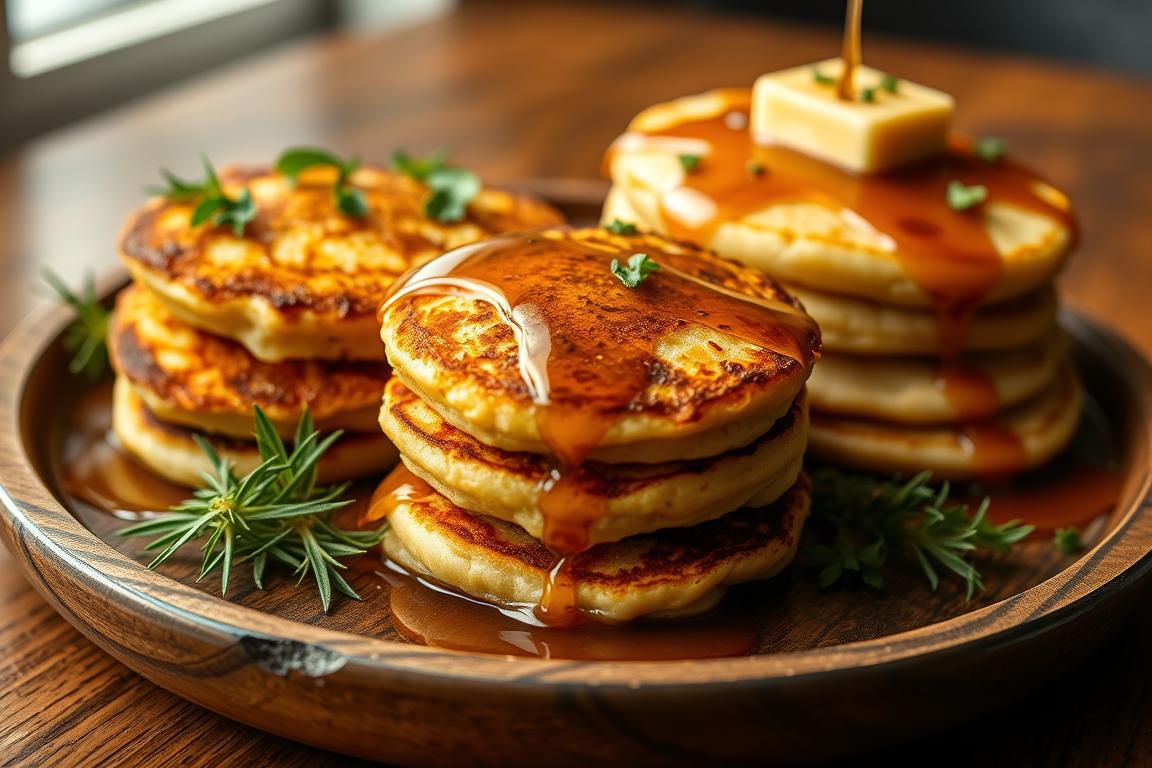Ever wondered why “potato cakes” means different things in the U.S.? The way we talk about potatoes shows our rich food culture. From potato pancakes to hash browns, each dish tells a story of American taste and tradition.
In America, potato cakes are many things, all made from potatoes. They come in different shapes and names, depending on where you are. This article explores how potatoes are enjoyed in various parts of the country. It shows how places like Idaho have their own potato recipes, blending local tastes with immigrant influences.
To learn more about different popular pasta shapes, check out this insightful article on penne versus ziti.
Key Takeaways
- Potato cakes in America have diverse names and variations.
- Regional differences influence the terminology of potato pancakes.
- Understanding these distinctions enhances appreciation for American food traditions.
- Potatoes are a versatile staple with strong cultural significance across the U.S.
- Each type of potato cake reflects unique preparation methods and ingredient usage.
Understanding Potato Cakes
Potato cakes show how versatile potatoes can be. They are a tasty dish in many cultures. Depending on where they come from, they can look and taste different.
Definitions and Variations
Potato cakes are made from mashed or grated potatoes. They often include flour and spices for extra flavor. You can find simple patties or more complex versions.
In Northern England, they call a thin battered slice a potato scallop. In Australia and New Zealand, they’re known as potato cakes or fritters. In the U.S., they’re like hash browns, especially at breakfast.
Global Perspectives on Potato Cakes
Looking at potato cakes around the world shows how different cultures use them. Jewish latkes are famous during Hanukkah. They show off traditional cooking.
Irish boxty and Swiss rösti are other examples. They use local ingredients and cooking methods. This shows how potatoes are important in many cultures.
Popular Names for Potato Cakes in America
In America, potato cakes have many names across different regions. These names show local traditions and cultural influences. They help us see the rich variety of American food culture.
Regional Differences in Names
Different parts of the United States have their own names for potato cakes. For example, *hash browns* are common in the south. Meanwhile, the Midwest calls them *potato pancakes*. Some places call them *potato patties*, showing how food names vary by region.
This highlights how cooking and ingredients change based on where you are.
The Influence of Local Cuisines
Local cuisines play a big role in naming potato dishes in America. Immigrants have brought many potato dishes, making them local favorites. For example, *latkes* and *fritters* come from German and Eastern European traditions.
This mix of cultures shows how potato cakes are a big part of American food.
What are potato cakes called in America?
In the United States, potato cakes have many names. These names show different cooking methods and ingredients. They reflect the tastes and resources of each region. Knowing these names helps us appreciate the variety and importance of these dishes.
Commonly Used Terms
Here are some popular names for potato cakes:
- Hash Browns: Made from grated or shredded potatoes, they’re pan-fried until crispy.
- Potato Pancakes: These are made with a batter of egg and flour, giving them a fluffy inside.
- Latkes: Known in Jewish cuisine, these are grated potato cakes eaten during Hanukkah.
These names show how ingredients and cooking methods shape our culinary language. They lead to many different ways of making potato cakes.
How Names Reflect Ingredients and Preparation
The names of potato cakes often tell us how they’re made and what’s in them. For example, “potato pancake” means they have potatoes and eggs. On the other hand, “hash browns” are potatoes cooked until they’re golden brown. This connection between names and cooking shows the rich diversity of American cooking.
Potato Pancakes: A Closer Look
Looking into the history of potato pancakes shows us rich culinary traditions, especially in Eastern Europe. These dishes started when potatoes were a reliable food, especially when other foods were scarce. Over time, different cultures took these recipes and made their own versions, creating the wide variety of potato dishes we enjoy today.
Origins and Historical Context
Potato dishes have their roots in many cultures facing food shortages, especially Jewish communities in Europe. As potatoes became a main ingredient, many recipes evolved. This led to different types of potato pancakes, each with its own flavor and ingredients.
Variations Across Different Cultures
There are many names and ways to make potato pancakes around the world. For example:
- Belarusian draniki are crispy potato pancakes often seasoned with onion.
- Polish placki ziemniaczane are served with sour cream or apple sauce.
- Czech bramborák has garlic, giving it a special taste.
The ability of these recipes to adapt shows how important potato dishes are globally. Different regions and ingredients create unique flavors, making potato pancakes a favorite dish worldwide.

Latkes and Their Significance
Latkes are more than a tasty dish; they hold deep cultural meaning in Hanukkah traditions. During this time, Jewish families come together to make and enjoy these potato pancakes. It’s a way to connect with their heritage and family history.
The act of making latkes is not just cooking. It’s about keeping their identity alive. Families pass down recipes through generations. This creates a sense of unity and belonging.
Cultural Importance During Hanukkah
Latkes are a key part of Hanukkah, celebrating the miracle of oil. They symbolize gratitude and resilience in the Jewish community. When families cook and share stories, they strengthen their bonds and honor their traditions.
Each bite of latke is a taste of their cultural heritage. It’s a way to connect with their history and values.
Ingredients and Preparation Methods
A traditional latke recipe uses simple ingredients like grated potatoes, onions, eggs, and flour. These are mixed and fried in oil. This method gives latkes their crispy texture and connects them to their history.
Today, families might add ingredients like zucchini or sweet potatoes. This adds a personal touch while staying true to tradition.
| Latke Ingredients | Preparation Methods |
|---|---|
| Grated potatoes | Frying |
| Onions | Mixing with other ingredients |
| Eggs | Binding the mixture |
| Flour | Creating a batter-like consistency |
| Oil (vegetable or others) | Cooking to achieve crispiness |
Hash Browns: Another American Favorite
Hash browns and potato pancakes are two favorites in American breakfasts. They differ in texture and how they’re made.
Differences Between Hash Browns and Potato Pancakes
Hash browns are made from grated or diced potatoes, pan-fried for a crispy outside. This makes them a hit for breakfast. Potato pancakes, on the other hand, use a batter for a softer texture and uniform shape. These differences show the variety in breakfast potato dishes.
How Hash Browns Became a Breakfast Staple
Hash browns have become a key part of American breakfasts. They’re found in diners and fast-food places, adding flavor to eggs, bacon, and toast. Their ease of making has made them popular in busy homes. Hash browns have also become part of many meals, showing their versatility in American breakfast culture.
To understand the differences, here’s a table comparing hash browns and potato pancakes:
| Feature | Hash Browns | Potato Pancakes |
|---|---|---|
| Texture | Crispy | Soft |
| Preparation Method | Pan-fried grated or diced potatoes | Batter-based, fried |
| Serving Style | Often served in a heaping mound | Typically shaped into uniform discs |
| Common Pairings | Eggs, bacon, toast | Sour cream, applesauce |
Knowing the differences between hash browns and potato pancakes helps us appreciate these classic potato dishes in breakfast. Each offers a special taste experience, adding to the variety of American breakfasts.
Rösti and Its Variations
Rösti is a favorite Swiss potato dish that has found a place in American cuisine. It’s made from grated potatoes, showing how international flavors blend well with local cooking. In the US, rösti is loved for its crispy texture and simple preparation.
Swiss Influences in American Cuisine
Rösti’s journey into American cuisine is interesting. It’s a hit on brunch menus, loved by many. Its similarity to potato cakes shows its adaptability. Cooks use quality ingredients and add herbs or cheeses to make it special.
Preparation Techniques and Ingredients
To get rösti right, you need to know the right preparation methods. It’s all about shredding potatoes and frying them until they’re golden and crispy. Unlike other potato cakes, rösti doesn’t use flour or eggs, letting the potatoes take center stage.
Getting the cooking just right is key. It makes the outside crispy and the inside soft. Paying attention to detail makes rösti a standout dish.
Boxty: The Irish Potato Cake
Boxty is a cherished part of Irish food culture, celebrating potatoes’ versatility. It mixes raw grated and cooked potatoes for a special texture. The recipe can vary by region, with some using flour and others baking soda.
Ingredients and Recipe Variations
The classic boxty recipe includes:
- Grated raw potatoes
- Mashed cooked potatoes
- Flour
- Baking soda
- Milk or water
- Salt
Each region has its own twist, making boxty a family favorite. It’s often fried or baked, adding to its appeal in Irish breakfasts.
Connection to Irish Culture
Boxty is more than just a dish; it’s a piece of Irish history. It shows how potatoes are key to Irish identity. Families have kept the recipe alive, making it a symbol of tradition and community.

Exploring Other Potato Cake Variants
Potato fritters are a tasty way to enjoy potatoes, loved by many cultures. They come in many potato fritters types, each with its own taste and making method. These fritters are great as appetizers or sides, especially with savory sauces.
Potato Fritters and Their Popularity
Potato fritters are popular in homes and restaurants for their flexibility. They can be thin and crispy or thick, made with mashed potatoes. Their appeal lies in being easy to customize with various sauces and toppings.
Trying different preparation styles lets you fully enjoy these diverse potato dishes.
Potato Patties and Croquettes
Potato patties use leftover mashed potatoes, making them a smart choice. They’re seasoned, shaped into cakes, and then fried or baked. Potato patties recipes focus on simple yet tasty flavors.
Potato croquettes, meanwhile, are a chance for creative cooking. They can have fillings like cheese, veggies, or meats. The croquettes preparation involves breading and frying until they’re golden. Each bite is a mix of textures and tastes, showing the wide range of potato cakes.
The Role of Potatoes in American Cuisine
Potatoes are a key part of American food, loved in many cultures and cooking styles. They’ve grown from simple foods to special treats that show their taste and flexibility. Potatoes are more than just food; they help shape America’s food scene.
From Staple to Specialty
Potatoes have always been a reliable food source in the U.S. Places like Idaho are famous for their potatoes, known for their taste and texture. Today, potatoes are a favorite, with new recipes and ways to cook them that celebrate their versatility. This shows how potatoes are still important in making tasty, filling meals for everyone.
Regional Celebrations and Dishes
In the U.S., different areas have their own potato dishes, celebrated at food festivals. Events like the Idaho Potato Bowl highlight local pride in potatoes. These festivals let people enjoy different potato dishes and share in food traditions. Recipes range from baked and mashed to fried or roasted, each with its own flavor that honors local cuisine.
| Region | Signature Potato Dish | Culinary Celebration |
|---|---|---|
| Idaho | Baked Potato | Idaho Potato Bowl |
| New Hampshire | Potato Wontons | New England Food Festival |
| Texas | Potato Salad | Texas State Fair |
| Ohio | Perogies | Perogie Fest |
Cultural Influences on Potato Cake Naming
Potatoes have a big role in American food culture. They started in the 1500s and became a key food in America. Potato cakes show how potatoes have changed over time, reflecting American history.
Historical Significance of Potatoes in American Food
Potatoes are a staple in the US, loved by all. They’re used in many dishes, making them a common sight on tables. Their ability to grow in different climates has made them a lasting part of American food.
The names of potato cakes come from the ingredients and the cultures that make them. As these cakes evolved, they picked up flavors and textures from different traditions. This mix of influences has made potato cakes a unique part of American cuisine.
Impact of Immigration on Potato Dishes
Immigration has greatly influenced American food, especially potato dishes. Irish immigrants brought dishes like colcannon and boxty. Eastern European immigrants introduced latkes.
This cultural food exchange has led to many potato cake variations. These dishes show how potatoes have been shaped by different cultures. They tell a story of culinary evolution in America.
Conclusion
Potato cakes weave together many American culinary traditions. They show how different cultures shape our food. From latkes during Hanukkah to hash browns at breakfast, they highlight the potato’s importance.
This journey is more than just recipes. It shows the rich diversity of American food. Each dish tells a story of immigrants and local ingredients, creating a unique taste of America. For more on potato pancakes, check out Wikipedia.
Potato cakes are more than food; they carry family stories and traditions. They stay in American kitchens, changing yet keeping their heritage alive. To learn about other cultural dishes, like tortellini, visit Amalia Recipes.


